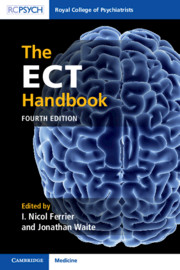Book contents
- The ECT Handbook
- The ECT Handbook
- Copyright page
- Contents
- Contributors
- Preface
- Chapter 1 The Place of ECT and Related Treatments in Contemporary UK Psychiatry
- Chapter 2 Mechanism of Action of ECT
- Chapter 3 ECT in the Treatment of Depression
- Chapter 4 ECT in Mania (and Mixed States)
- Chapter 5 Electroconvulsive Therapy in Bipolar Disorder Depression
- Chapter 6 ECT in Older Adults
- Chapter 7 ECT in People with an Intellectual Disability
- Chapter 8 ECT in Pregnancy and Postnatally
- Chapter 9 Electroconvulsive Therapy in Children and Adolescents
- Chapter 10 The Use of ECT in the Treatment of Schizophrenia
- Chapter 11 The Use of ECT in the Treatment of Catatonia
- Chapter 12 ECT in Neuropsychiatric Disorders
- Chapter 13 Cognitive Side-Effects of ECT
- Chapter 14 Non-cognitive Adverse Effects of ECT
- Chapter 15 Transcranial Magnetic Stimulation
- Chapter 16 Neurosurgery for Mental Disorder
- Chapter 17 Ketamine for Psychiatric Disorders
- Chapter 18 The ECT Accreditation Service (ECTAS)
- Chapter 19 The Scottish ECT Accreditation Network (SEAN)
- Chapter 20 Medical Training for Psychiatrists in ECT
- Chapter 21 Nursing Care of the Patient Receiving ECT and the Roles of the ECT Nurse
- Chapter 22 Practical Aspects of ECT
- Chapter 23 Anaesthesia for Electroconvulsive Therapy
- Chapter 24 Dental Issues Related to ECT
- Chapter 25 Interactions between ECT and Prescribed Medication
- Chapter 26 Seizure Monitoring in ECT
- Chapter 27 Safe ECT Practice in People with a Physical Illness
- Chapter 28 Capacity, Consent and the Law
- Chapter 29 Patients’, Carers’ and the Public’s Perspectives on ECT and Related Treatments
- Index
- References
Chapter 18 - The ECT Accreditation Service (ECTAS)
Published online by Cambridge University Press: 27 June 2019
- The ECT Handbook
- The ECT Handbook
- Copyright page
- Contents
- Contributors
- Preface
- Chapter 1 The Place of ECT and Related Treatments in Contemporary UK Psychiatry
- Chapter 2 Mechanism of Action of ECT
- Chapter 3 ECT in the Treatment of Depression
- Chapter 4 ECT in Mania (and Mixed States)
- Chapter 5 Electroconvulsive Therapy in Bipolar Disorder Depression
- Chapter 6 ECT in Older Adults
- Chapter 7 ECT in People with an Intellectual Disability
- Chapter 8 ECT in Pregnancy and Postnatally
- Chapter 9 Electroconvulsive Therapy in Children and Adolescents
- Chapter 10 The Use of ECT in the Treatment of Schizophrenia
- Chapter 11 The Use of ECT in the Treatment of Catatonia
- Chapter 12 ECT in Neuropsychiatric Disorders
- Chapter 13 Cognitive Side-Effects of ECT
- Chapter 14 Non-cognitive Adverse Effects of ECT
- Chapter 15 Transcranial Magnetic Stimulation
- Chapter 16 Neurosurgery for Mental Disorder
- Chapter 17 Ketamine for Psychiatric Disorders
- Chapter 18 The ECT Accreditation Service (ECTAS)
- Chapter 19 The Scottish ECT Accreditation Network (SEAN)
- Chapter 20 Medical Training for Psychiatrists in ECT
- Chapter 21 Nursing Care of the Patient Receiving ECT and the Roles of the ECT Nurse
- Chapter 22 Practical Aspects of ECT
- Chapter 23 Anaesthesia for Electroconvulsive Therapy
- Chapter 24 Dental Issues Related to ECT
- Chapter 25 Interactions between ECT and Prescribed Medication
- Chapter 26 Seizure Monitoring in ECT
- Chapter 27 Safe ECT Practice in People with a Physical Illness
- Chapter 28 Capacity, Consent and the Law
- Chapter 29 Patients’, Carers’ and the Public’s Perspectives on ECT and Related Treatments
- Index
- References
Summary
ECTAS was launched in May 2003 coinciding with the publication of the NICE (National Institute for Clinical Excellence) guidance on the use of ECT (NICE, 2003). Its aim was to improve the standard of practice in ECT units in the United Kingdom and Republic of Ireland using a model of continuous quality improvement.
- Type
- Chapter
- Information
- The ECT Handbook , pp. 161 - 163Publisher: Cambridge University PressPrint publication year: 2019



